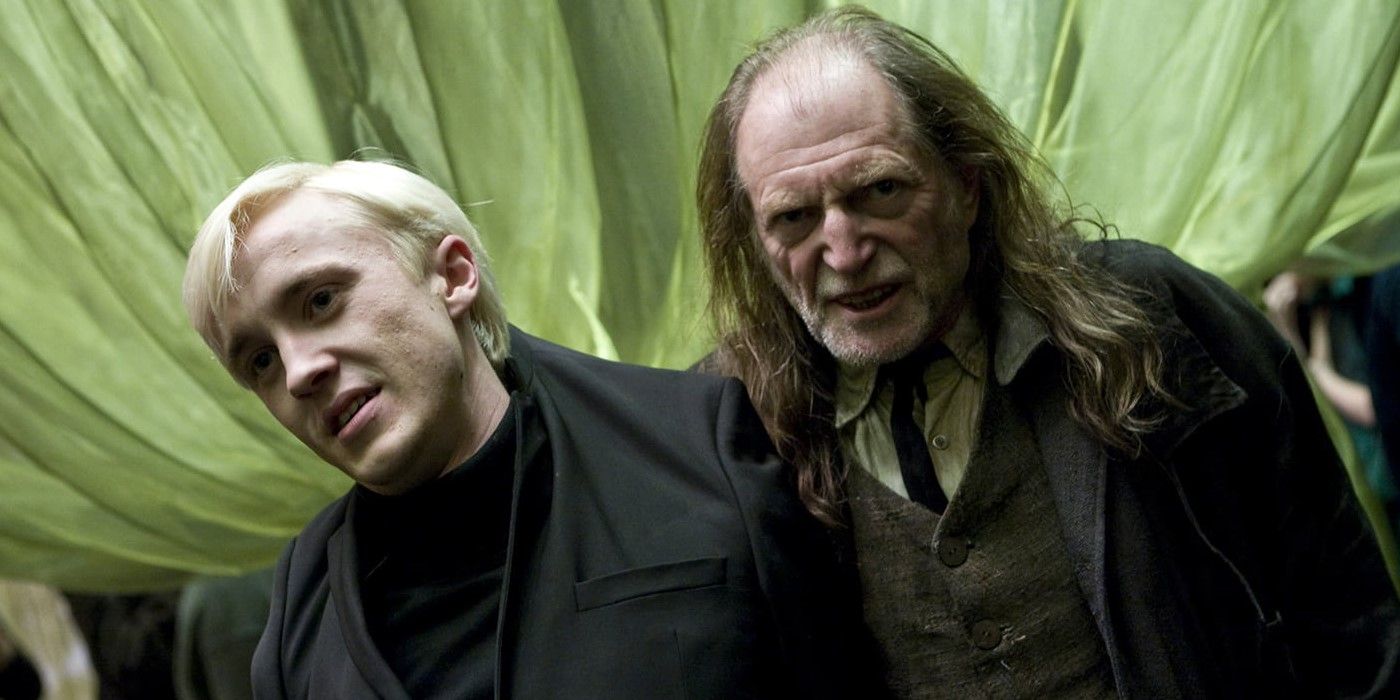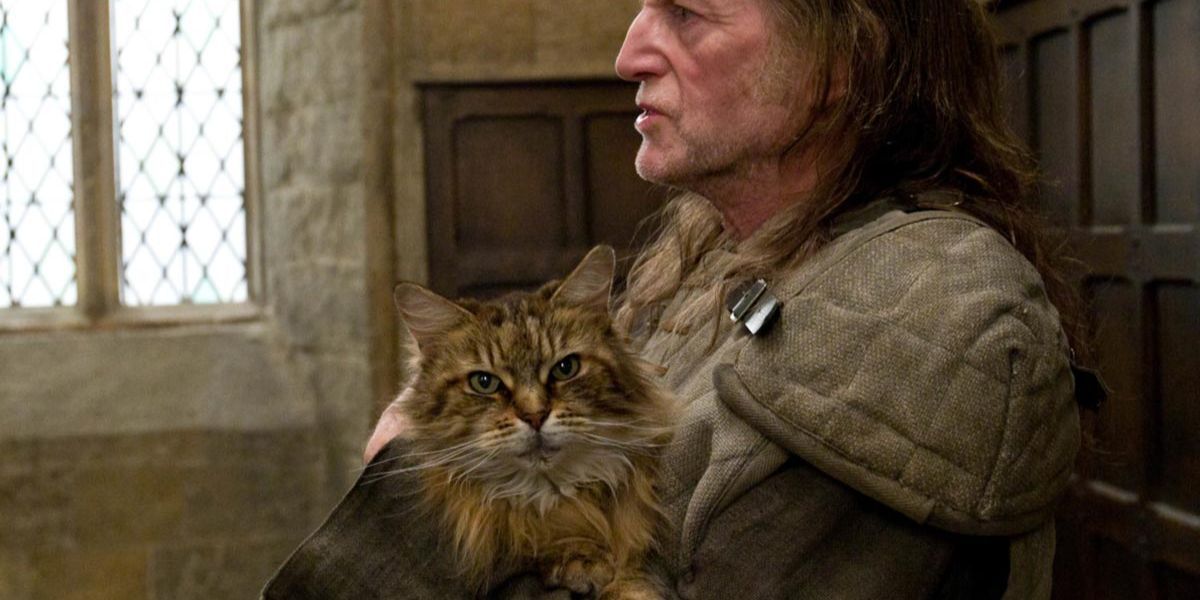
With a huge franchise like Harry Potter—eight films and over 770 characters—it’s not surprising some characters remain enigmatic. Argus Filch is one of those, often seen as just a grumpy source of humor. However, many believe he’s actually a Squib—someone born into a magical family but without magical abilities—and forced to work as a caretaker. But a fascinating and unsettling theory suggests something even stranger: that Filch isn’t human at all.
A popular fan theory proposes that Argus Filch isn’t just a caretaker at Hogwarts, but a supernatural part of the castle itself – a living expression of its personality, much like Peeves embodies the castle’s mischievous side. The more you consider it, the more logical it seems: Filch always seems to be where he’s needed, instinctively knows when trouble is brewing, and is deeply invested in maintaining order and punishing rule-breakers. The idea is that Filch is Hogwarts, or at least represents one aspect of its complex character.
Argus Filch Might Be Hogwarts’ Dark Secret
For those who love the world of Harry Potter, it’s often noted that Argus Filch is a deeply sad character, and that’s perhaps the most tragic thing about him. We see this clearly in Harry Potter and the Chamber of Secrets when Harry discovers Filch’s Kwikspell letter – a mail-order magic course. It reveals a man longing to be part of the magical world, but constantly held back by his own inability to achieve success, and defined by being an outsider looking in.
Dumbledore sometimes suggests that Filch is employed out of pity, to give him a sense of belonging. However, this explanation doesn’t really hold up when you think about it logically. The main problem is that his job isn’t necessary. Hogwarts already has a large staff of House-elves who are more than capable of handling all the cleaning, and they actually enjoy doing it. They can clean the entire castle magically in an instant.
Even Molly Weasley uses simple spells to do housework, showing that magic for everyday tasks is common knowledge. Filch, with his old-fashioned cleaning tools, seems out of place – he’s a strange choice for a school that’s supposed to be the most magically advanced in Britain. Plus, the school already has plenty of magical staff – professors, prefects, and the Head Boy and Girl – who are much better suited to dealing with students who cause trouble.
It doesn’t really make sense that Hogwarts needs Argus Filch, so the idea that Dumbledore keeps him out of pity feels weak. While Dumbledore is known for his kindness, he’s also incredibly clever. What really makes the idea that Filch is a Squib unbelievable is how skilled he is. Someone without magic shouldn’t be the school’s most effective guard, yet he seems to be everywhere. How does Filch know the castle’s secret passages so well – better than anyone? That’s not just a talent, it’s a detailed understanding of a building that constantly rearranges itself. And how does he appear instantly whenever someone breaks a rule, just like a ghost?
Filch is almost always present when students are up to no good or sneaking around restricted areas. Students constantly worry about him discovering their misdeeds, and it’s not just about being caught out of bed—he seems to magically know exactly what they’ve done. Even his name, Argus, hints at his all-seeing nature, referencing the many-eyed giant from Greek myths.
In Harry Potter, Peeves and Filch Have a Unique Connection
Peeves the Poltergeist isn’t a major character, but he’s one of the most fascinating in the Harry Potter books. A popular theory offers a surprisingly sensible explanation for his existence. It suggests that Filch, the caretaker, and Peeves are connected. J.K. Rowling established that Peeves isn’t a typical ghost, but something different – a poltergeist. This means he’s a physical being created by the wild, energetic atmosphere of a school full of young witches and wizards.
Peeves is essentially the embodiment of all the pranks and trouble students have caused at Hogwarts over the years – the castle’s instinct for playful chaos. Given that Hogwarts could seemingly create someone purely to cause trouble, it makes sense there would also be a force dedicated to maintaining order. Every prank and mess created a need for someone to restore discipline and clean things up. The idea is that this need took physical form as well, and that person is Argus Filch, whose job is to control the chaos.
Peeves represents the castle’s wild, destructive side, while Filch embodies its strict, controlling nature. Their constant conflict isn’t just a personal rivalry; it’s a fundamental struggle between these two forces, which have always been a part of Hogwarts. This idea changes how we see the castle, suggesting it’s more than just a building – it’s a powerful spirit with a life of its own, capable of creating its own protectors. Filch and Peeves are like opposing sides of the same coin, and understanding this makes all of Filch’s quirks and behaviors make sense. This theory offers a fresh perspective, reinterpreting everything fans have experienced in the books and films.
Perhaps Filch doesn’t rely on instinct, but on the castle itself guiding him. His unusual connection with Mrs. Norris isn’t just a pet owner relationship—it’s more like they share a single mind. Maybe Mrs. Norris isn’t a pet at all, but a part of how Filch does his job. Notice how quickly he appears whenever she finds something amiss—she acts as the castle’s eyes and ears, like the talking portraits, and Filch is the one who takes action.
Filch’s True Purpose Makes Him Harry Potter’s Saddest Character
The idea that Hogwarts is a magical being makes a lot of sense within the world of Harry Potter. Magic in Rowling’s books isn’t just about spells – it’s strongly connected to feelings, driven by what someone wants, and influenced by memories. It almost seems like a living force, as we see with Harry himself, who carries a magical protection from his mother. Things like wands choosing wizards and the power of love to protect people show this isn’t a simple system. Given Hogwarts’ age and the intense emotions experienced within its walls, it’s believable the castle could develop a kind of awareness, actively showing its own intentions through places like the Room of Requirement.
The staircases at Hogwarts seem to move on their own, almost as if they have a will, and the castle even actively blocked Dolores Umbridge from entering Dumbledore’s office. This suggests Hogwarts might be more than just a building – it could be a sentient being with its own feelings, even a darker side. This idea changes how we see Filch’s most disturbing moment in Harry Potter and the Order of the Phoenix: his joyful tears when Umbridge allows him to punish students. If Filch were simply a person, he’d be a very troubled sadist. But if he’s connected to the castle itself, his joy isn’t about cruelty; it’s the satisfaction of the castle finally being able to enforce its rules, regardless of who is in power. Filch doesn’t care who is in charge, only that rules are followed.
This explains why Filch acts so strangely in Harry Potter and the Deathly Hallows when Snape and the Carrows are in charge. Someone loyal to Dumbledore would have resisted or resigned, but Filch simply continues working. He does this because the Carrows, despite their cruelty, represented the new authority. Filch isn’t a person who can rebel; he’s essentially part of the castle itself. He’s programmed to serve whoever is in power, not necessarily who that person is. This idea is further supported by the events in Chamber of Secrets. When the Basilisk attacks, it doesn’t kill Filch, even though he’s constantly patrolling the castle’s darkest corners – areas where he should have been a victim. Instead, it petrifies Mrs. Norris. The Basilisk didn’t attack Filch himself, but rather his connection to the castle – his ‘eyes’ and ears within its walls.
It doesn’t matter if the author intended this interpretation or if fans came up with it – this idea perfectly explains everything about Filch and makes him a much more complex character. It reimagines him as a sort of ghost, neither truly living nor dead, endlessly cleaning up the chaos caused by generations of students. This is powerfully shown at the very end of Harry Potter and the Deathly Hallows Part 2. After the battle, among the ruins and fallen wizards, we see Filch still sweeping. He survived a war that claimed many powerful lives, yet he’s simply trying to clean up the devastated castle with only a broom. He can’t possibly fix it alone, but that doesn’t stop him – it’s just who he is. He represents the castle’s enduring spirit, its attempt to heal itself even in the face of overwhelming destruction.
Read More
- Clash Royale Best Boss Bandit Champion decks
- Vampire’s Fall 2 redeem codes and how to use them (June 2025)
- World Eternal Online promo codes and how to use them (September 2025)
- How to find the Roaming Oak Tree in Heartopia
- Best Arena 9 Decks in Clast Royale
- Mobile Legends January 2026 Leaks: Upcoming new skins, heroes, events and more
- ATHENA: Blood Twins Hero Tier List
- Clash Royale Furnace Evolution best decks guide
- Brawl Stars December 2025 Brawl Talk: Two New Brawlers, Buffie, Vault, New Skins, Game Modes, and more
- What If Spider-Man Was a Pirate?
2025-11-13 20:10
